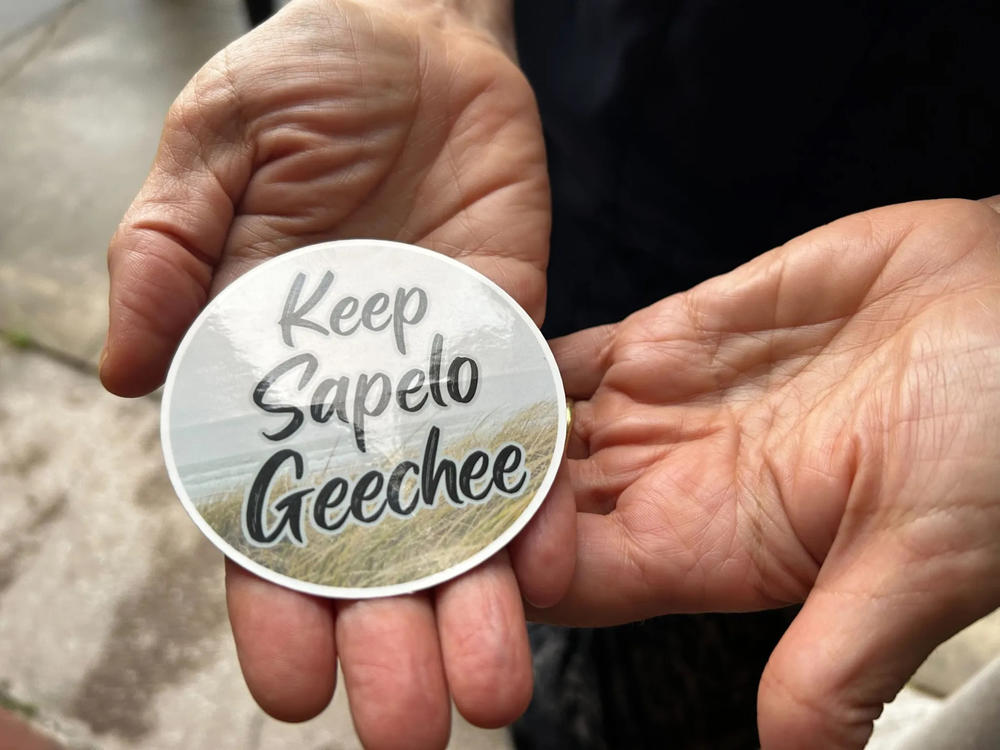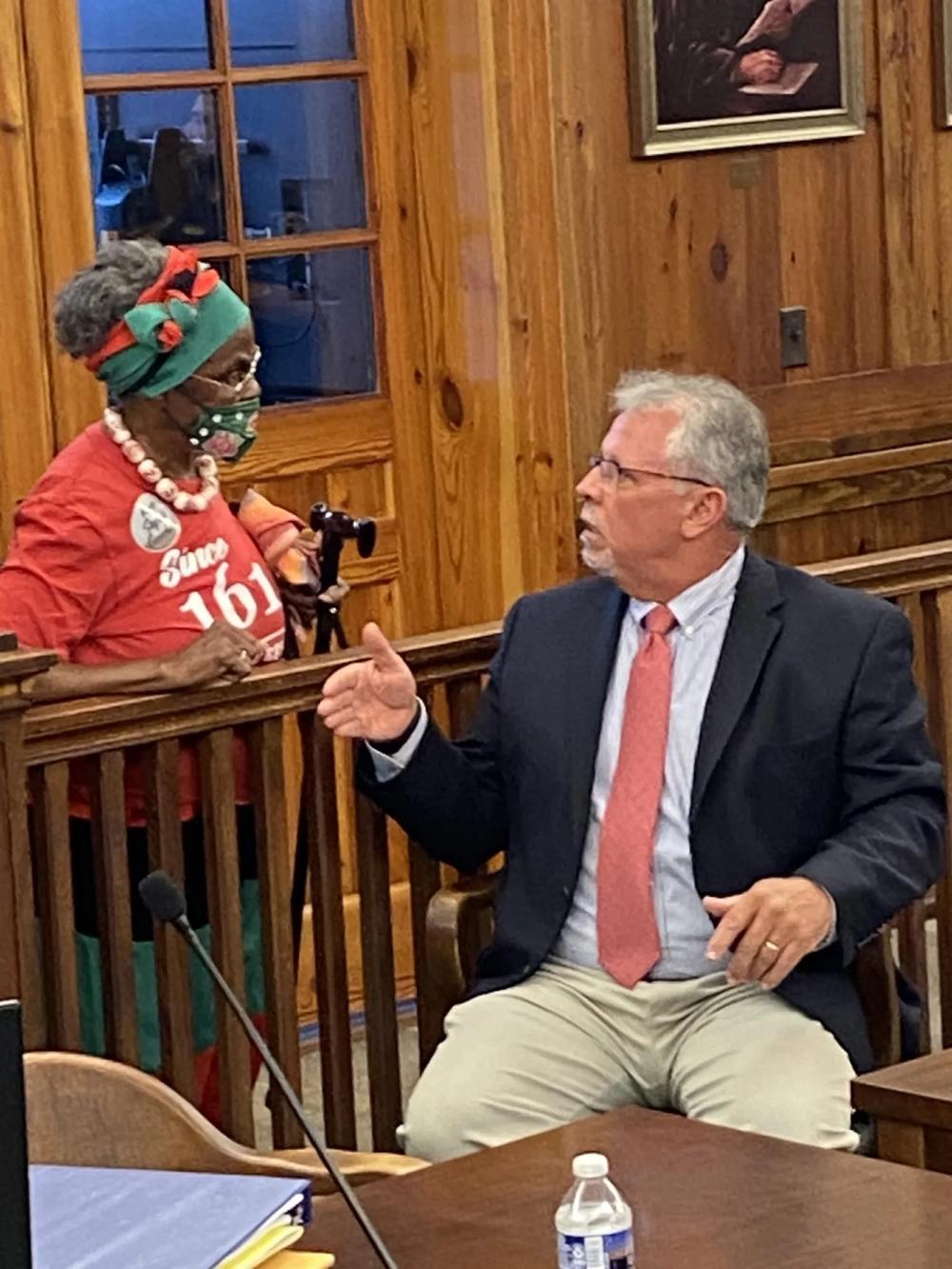
Caption
Nine Sapelo residents, all descendents of enslaved people who worked the island’s plantations, say new zoning will unfairly push them off their ancestral land
Credit: The Current

Nine Sapelo residents, all descendents of enslaved people who worked the island’s plantations, say new zoning will unfairly push them off their ancestral land
Mary Landers, The Current
Black residents of Sapelo Island are mounting a legal challenge to a controversial rezoning they fear will lead to higher taxes and ultimately spell the demise of the only remaining intact Gullah-Geechee community on the coast.
A complaint filed Thursday in McIntosh County Superior Court asks the court to undo the zoning for a number of reasons, including that it “discriminates against the historically and culturally important Gullah-Geechee community on Sapelo Island on the basis of race, and that it is therefore unconstitutional, null, and void.”
The nine plaintiffs are: Georgette “Sharron” Grovner, Marvin “Kent” Grovner Sr., Lula B. Walker, Francine Bailey, Mary Bailey, Merden Hall, Florence Hall, Yvonne Grovner, and Ire Gene Grovner Sr. Attorneys from Southern Poverty Law Center and Bondurant, Mixson & Elmore are representing them. McIntosh County and the five-member McIntosh County Board of Commissioners — Kate Pontello Karwacki, David Stevens, Davis Poole, William E. Harrell, and Roger Lotson — are named as defendants.
Each plaintiff is a Black “resident, citizen, and taxpayer of Sapelo Island and McIntosh County” and each was present at the Sept. 7, 2023, meeting of the Planning and Zoning Commission, the complaint notes.
None will be able to afford to continue living on Sapelo if the property taxes on the island significantly increase, the complaint also notes.
“Plaintiffs’ land has been in their families for many years, and they plan to bequeath this land to their children and grandchildren,” the attorneys write. “Selling land that has been in their families for decades or generations is untenable for Plaintiffs not only because they will have nowhere else to go, but also because they will be deprived of the opportunity to pass on a rich legacy and intergenerational wealth to their families.
The new zoning, which the McIntosh County Commission passed on September 12, allows larger, taller homes in the small community on Sapelo, where the descendants of enslaved people who worked the island’s plantations have lived for generations. The changes increase the maximum house size from 1,400 square feet of heated space to 3,000 square feet of enclosed space. It increases the allowable height from 1.5 stories to 37 feet tall. Residents fear the changes will attract wealthy developers and drive up property values.
The complaint traces the history of the Gullah-Geechee on Sapelo, explaining that “in the mid-1900s, Richard J. ‘RJ’ Reynolds Jr. dispossessed Gullah-Geechee descendants on Sapelo Island of 1,000 acres of land that their families had purchased in Racoon Bluff, on the north end of Sapelo Island, and relocated the Gullah-Geechee descendants to a 434-acre plot in the south-central area of the Island known as Hogg Hummock.”
The Gullah-Geechee community refers to the residential area on Sapelo as “Hogg Hummock,” rather than the spelling “Hog Hammock,” that government documents use, a footnote in the complaint explains.
“A hummock is a forested ground that rises above marshland, where the hogs were raised during the antebellum period,” it notes. ” ‘Hogg’ is also a Geechee family surname.”
Attempts by Black residents of Hogg Hummock to engage the county in rezoning more than two years ago were largely ignored and instead “the proposed zoning amendments were prepared by the McIntosh County Board of Commissioners with the assistance of a white private individual who owns land on the Island and the State of Georgia’s Coastal Regional Commission,” the complaint states.

Alberta Mabry of Darien and a Hogg Hummock descendant talks to commission chair David Stevens after he cast the deciding vote in rezoning Sapelo Island.
The commission majority’s motivation was evident after the final vote, in a statement from Chairman David Stevens, who cast the deciding vote for the change, the complaint states.
“Chairman Stevens opined that the solution for Hogg Hummock descendants ‘who do not want these houses being built’ was to simply ‘stop selling [their] land,’ ” the complaint states. “Touting his relationships with older and deceased Hogg Hammock residents, Chairman Stevens concluded his comments stating that the Lord called home his favorites, while ‘this next generation doesn’t have it, nor will they ever.’ “
Along with the allegation of discrimination, the filing takes issues with what the plaintiffs see as failures to follow Georgia’s Open Meeting and Zoning Procedures acts.
The county published notices of the Planning and Zoning Board meeting as well as the workshop and meeting for the County Commission, but failed to provide for a practical time and place for island residents, who travel by ferry to and from the island, to attend. While last-minute changes to the ferry schedule allowed residents to leave the mainland at 7:30 p.m. rather than the usual 5:30 p.m. last departure time, this accommodation was too little, too late, the attorneys contend.
“First, the changes came too close in time to give adequate notice of the hearing and allow some Island residents to arrange to attend,” the complaint states. “Second, the changes were not sufficient to accommodate the length of the September 7 public hearing, requiring individuals who needed to catch the last ferry to leave before the Planning and Zoning Commission deliberated on the ordinance and made decisions to materially amend its provisions. This denied Hogg Hummock residents a meaningful opportunity to participate in the notice and hearing process mandated by Georgia law.
Changes to the county’s zoning were not red-lined to make edits readily apparent, as required by law. Nor were written copies available for the public’s examination. The public was given the opportunity to comment only at the Planning and Zoning meeting and only before the board suggested its own changes.
The public was prohibited from recording at the three meetings, all held at the McIntosh County Courthouse. McIntosh authorities allowed members of the media to record at the third meeting only after The Current complained to Georgia’s Attorney General.
“There is no exemption under Georgia’s Open Meetings Act that would allow the County to prohibit the public from taking audio or visual recordings, and the County did not cite any legal authority for prohibiting the public from recording at these public meetings,” the complaint states.
On Friday, both Commisisoner Chairman David Stevens and County Manager Patrick Zoucks were out of the office and unavailable for comment. County Attorney Ad Poppell, and Commissioners Davis Poole and Kate Pontello Karwacki did not respond immediately to a request for comment.

McIntosh County Commissioner Roger Lotson
Commissioner Roger Lotson, who represents Sapelo, voted against the rezoning. He also tried unsuccessfully to postpone the vote to allow commissioners and the public more time to consider the changes.
“I regret that this has become a legal matter,” Lotson said in an email Friday. “However, I continue to believe that increasing the size of houses in Hog Hammock to 3,000 square feet was not the right decision. I hope that a better outcome will prevail as this process continues. One that will address the concerns of the Board, descendants, and other stakeholders.”
Commissioner William E. Harrell, who is white, joined Lotson, who is Black, in the 3-2 vote in which the rezoning passed on Sept. 12.
“I don’t know what to say about the complaint, I voted no along with Mr. Lotson because I feel it was the right choice to support the Sapelo Island community,” Harrell said in an email to The Current.
The county has 30 days to respond to the complaint. McElrath expects the case to proceed more like a lawsuit than a typical zoning appeal.

Maurice Bailey standing in front of the community store on Sapelo Island.
“We are challenging the constitutionality of the law passed,” she said. “And so it will be more than just a traditional zoning appeal.” She expects a discovery phase to follow the county’s response.
The Sapelo rezoning fits a familiar pattern of land injustice, McElrath said.
“Stripping families of their land that their families have owned for generations is one of the most common ways that Black and Brown communities are systemically looted for their wealth,” she said. “And so we recognize that this is not just a zoning ordinance. This is not just about a number of square feet. This is about preserving both the historic nature of the land and preserving the ability to live on the land for this community.”
While the zoning repeal is getting underway in the court, activists have already launched a parallel track to undo the Hogg Hummock zoning through a referendum. They began gathering signatures last month, aiming to collect the 20 percent of registered voters needed to put the issue on the ballot early next year.
A successful lawsuit could make that effort unnecessary, said Maurice Bailey, founder, president and CEO of the nonprofit Save Our Legacy Ourself, which is helping to organize the petition drive.
“We hope so. That was the plan. We’re trying to do the right thing, the legal thing, the quickest path. The path that we hope they understand and abide by. So we’re hoping that this will solve everything and we’d be able to meet back at the table with everybody and not the unfair decision that was made by the commissioners and the colonizers, that we all can sit down together and come up with something.”
This story comes to GPB through a reporting partnership with The Current.